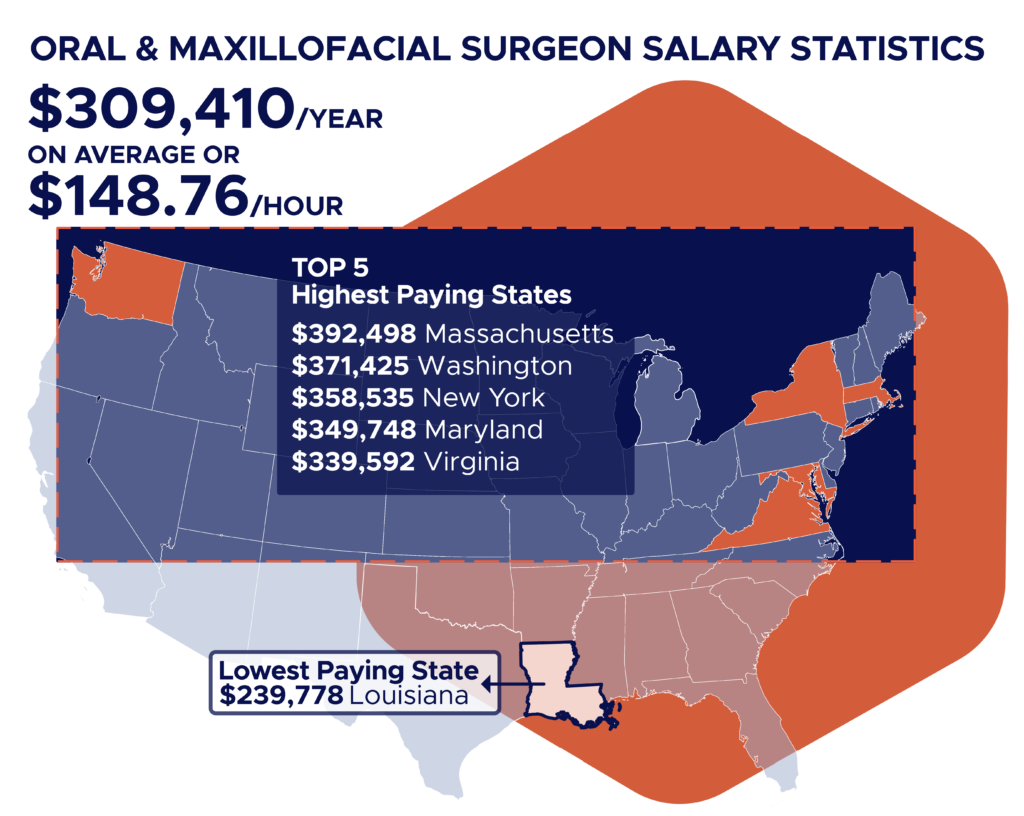- According to the U.S. Bureau of Labor Statistics, the mean annual wage for oral and maxillofacial surgeons is $309,410.
- Massachusetts is the highest paying state in the U.S. for oral and maxillofacial surgeons with a mean annual salary of $392,498, according to ZipRecruiter.
Oral and maxillofacial surgery blends the realms of medicine and dentistry, specializing in treating facial, jaw, and oral conditions. With their surgical expertise, these professionals provide vital care, aiming to restore function and enhance aesthetics.
Oral and maxillofacial surgery is the highest paying dental specialty, but like any job, their salaries can differ based on region, training, and other factors. Here’s what you should know about oral and maxillofacial surgeons’ salaries.
What is the average oral and maxillofacial surgeon salary?
According to ZipRecruiter, the average oral and maxillofacial surgeon salary is $336,000.
According to the BLS, the mean annual wage for oral and maxillofacial surgeons is $309,410.
How much do oral and maxillofacial surgeons make per hour?
The mean annual wage for oral and maxillofacial surgeons as reported by the BLS equates to an hourly wage of $148.76.
Oral and maxillofacial surgeon salary by state
Oral and maxillofacial surgeons’ salaries can vary greatly by state and territory, ranging from $239,778 in Louisiana to $392,498 in Massachusetts. According to ZipRecruiter, the average annual salary for oral and maxillofacial surgeons in each state are:
- Alabama – $288,392
- Alaska – $304,630
- Arizona – $306,452
- Arkansas – $323,943
- California – $323,353
- Colorado – $336,136
- Connecticut – $306,276
- Delaware – $327,393
- Florida – $251,433
- Georgia – $245,586
- Hawaii – $331,550
- Idaho – $329,749
- Illinois – $315,325
- Indiana – $297,571
- Iowa – $291,413
- Kansas – $280,801
- Kentucky – $338,540
- Louisiana – $239,778
- Maine – $314,786
- Maryland – $349,748
- Massachusetts – $392,498
- Michigan – $313,078
- Minnesota – $306,634
- Mississippi – $274,906
- Missouri – $339,039
- Montana – $292,661
- Nebraska – $327,822
- Nevada – $284,783
- New Hampshire – $293,399
- New Jersey – $304,579
- New Mexico – $289,130
- New York – $358,535
- North Carolina – $317,178
- North Dakota – $250,818
- Ohio – $282,276
- Oklahoma – $325,095
- Oregon – $302,872
- Pennsylvania – $285,925
- Rhode Island – $294,893
- South Carolina – $291,685
- South Dakota – $313,559
- Tennessee – $311,692
- Texas – $292,850
- Utah – $284,970
- Vermont – $316,639
- Virginia – $339,592
- Washington – $371,425
- West Virginia – $292,890
- Wisconsin – $283,171
- Wyoming – $304,389

Highest paying states for oral and maxillofacial surgeons
According to ZipRecruiter, these are the highest paying states for oral and maxillofacial surgeons:
- Massachusetts – $392,498
- Washington – $371,425
- New York – $358,535
- Maryland – $349,748
- Virginia – $339,592
Dentist salary by specialty: How do oral and maxillofacial surgeons’ salaries compare to other specialties?
According to BLS, oral and maxillofacial surgeons make an average of $309,410 per year, making them the highest paid dental specialty. The average salaries for other dental specialties are as follows:
- Orthodontists – $216,320
- Dentists, all other specialists – $179,400
- Dentists, general – $160,370
- Prosthodontists – $143,730
Before you go…
The earnings of dental professionals, such as oral and maxillofacial surgeons, can significantly differ based on factors like location, years of experience, and other variables.
Are you starting a new role? Panacea Financial Holdings partners with Panacea Legal to provide employment contract review services. Evaluate your offer, discuss compensation, and negotiate your contract to protect your interests and support your goals. Learn more here.
Adjusting to the sudden increase in salary when transitioning from training to practice can pose challenges. However, our Build Your Team initiative offers a valuable opportunity to connect with financial planning experts, budgeting specialists, tax professionals, and more at no cost. By availing this program, you can gain confidence in effectively negotiating and managing your new salary.
For more helpful information and tips, visit our Resources page or read one of our featured articles below:
- Considering a Job Change? Here’s What Doctors Should Know
- How Doctors Can Improve Their Credit Score & Other Common Credit Score Questions
- What You Need to Know About Credit Card Consolidation for Doctors
- Personal Loans for Doctors: What You Need to Know
Panacea Financial, a division of Primis. Member FDIC.





